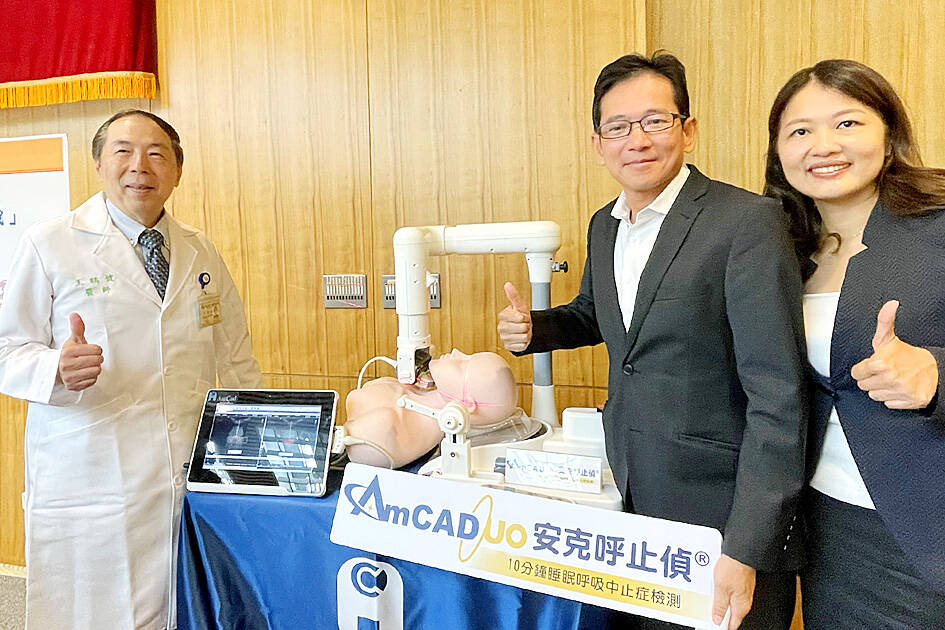National Taiwan University Hospital (NTUH) has developed an ultrasound device that uses artificial intelligence (AI) to assess in about 15 minutes a person’s risk of sleep apnea, as many people are not diagnosed due to the difficulty of undergoing a polysomnography, it said yesterday.
NTUH Health Management Center director Chiu Han-mo (邱瀚模) said that a US study found that about one in five people in the US have sleep apnea, one in 15 have severe sleep apnea and one in four middle-aged men have sleep apnea, but about 75 percent of those with severe sleep apnea are undiagnosed and untreated.
Untreated sleep apnea can increase the risk of heart disease, diabetes, stroke, memory loss, depression and other chronic diseases, he said, adding that people with severe sleep apnea are at more than double the risk of death and being involved in traffic incidents, and 1.5 times more likely to develop hypertension.

Photo: Chiu Chih-jou, Taipei Times
NTUH Health Management Center attending physician Tseng Ping-hui (曾屏輝) said that sleep apnea is underdiagnosed, as many people are not aware that their sleep is being interrupted.
If they suspect it, they should arrange for a 24-hour polysomnography to be diagnosed, which many find inconvenient, as they are often required to wait for a long time to be scheduled for the sleep study, Tseng said.
With at-home sleep apnea tests and other new methods being developed in the past few years, NTUH and a local biomedical company developed an AI-assisted ultrasound scan device to assess the risk of sleep apnea in about 10 to 15 minutes, he said.
NTUH said the device was developed by National Taiwan University professors Wang Hao-chien (王鶴健) and Argon Chen (陳正剛).
A clinical trial was conducted at the Stanford Sleep Medicine Center in California and the NTUH Health Management Center for the device, which has been approved by the Food and Drug Administration (FDA) and the US FDA, and received the EU’s CE marking certification, it added.
Tseng said that people who receive the AI-assisted ultrasound scan do not have to be asleep.
They only need to breathe several times as instructed and the device can assess their risk of obstructive sleep apnea in about 10 to 15 minutes, he said.
Of the more than 1,100 people who received the test at NTUH, 28 percent (108 people) were determined to be at high risk of sleep apnea and referred to the Center of Sleep Disorder for a through polysomnography, he said.
Of those referred for the sleep study, 103 were diagnosed with sleep apnea, an accuracy rate of about 95 percent, he said.
NTUH Center of Sleep Disorder director Hsu Wei-chung (許巍鐘) said that obstructive sleep apnea was previously thought to be more common in elderly people, those who are overweight or obese, and those who have a short neck, but clinical data collected from the ultrasound scan show that many people diagnosed with sleep apnea are not obese or elderly.
Most are in their 40s, Hsu said.
https://www.taipeitimes.com/News/taiwan/archives/2023/09/05/2003805778